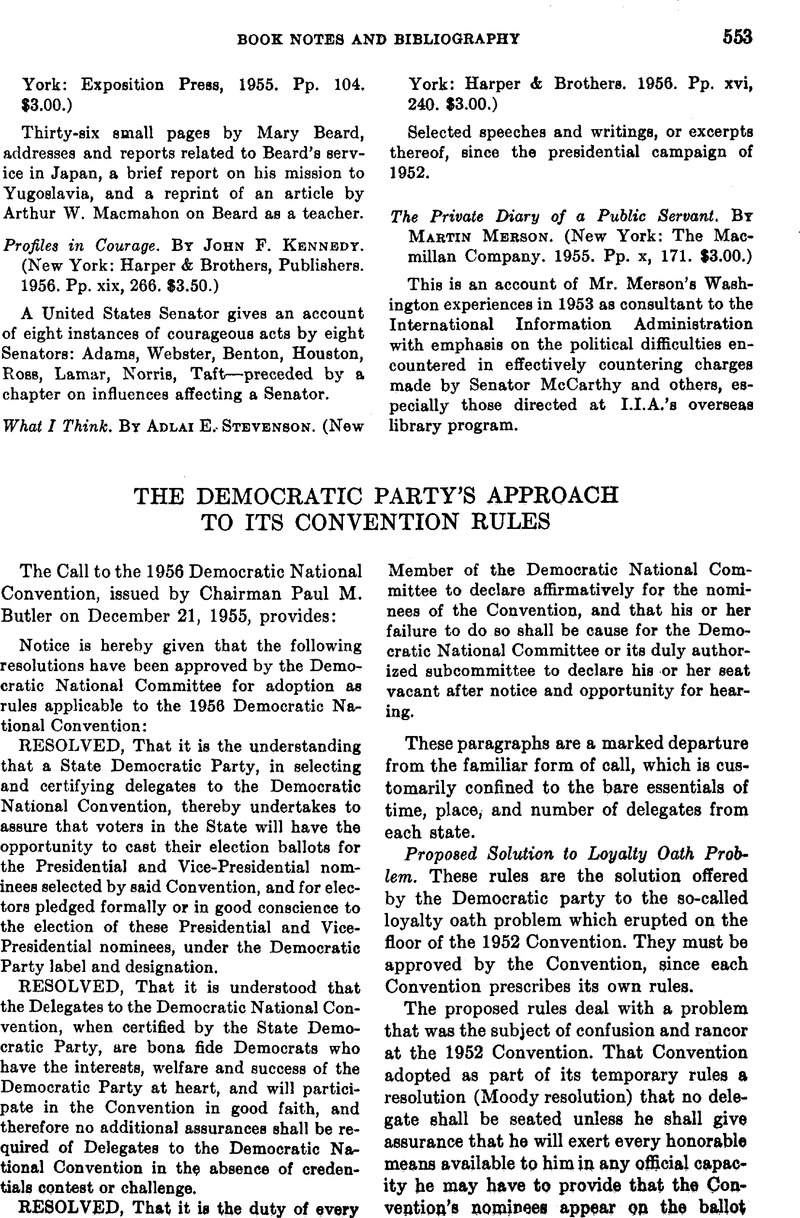No CrossRef data available.
Article contents
The Democratic Party's Approach to its Convention Rules
Published online by Cambridge University Press: 02 September 2013
Abstract

- Type
- Book Notes and Bibliography
- Information
- Copyright
- Copyright © American Political Science Association 1956
References
1 See Woodburn, James Albert, Political Parties and Party Problems in the United States (1944), p. 300 Google Scholar. Mr. Woodburn states that the places of both Mr. Cochrane (Massachusetts) and Mr. Harrity (Pennsylvania), who were out of sympathy with the purpose of the party in the 1896 campaign, were declared vacant by the National Committee. Apparently only Mr. Harrity contested the seat of his successor, Mr. J. M. Guffey, who was designated by a state convention.
2 Penniman, Howard N., Sait's American Parties and Elections, p. 317 Google Scholar.
3 See “Pennsylvania Member of National Democratic Committee—Answer of Harrity,” Library of Congress, Catalogue No. JK 2317, 1898A.
4 The case is so recorded in Cannon's Manual, and in Penninan, cited above,…. Expulsion suggests an element of “misfeasance,” whereas declaration of a vacancy would have a connotation of “nonfeasance.”
5 Berdahl, , “Party Membership in the United States,” 36 Am. Pol. Sci. Rev. (Feb.-April 1942)Google Scholar.
6 See “Minnesota” chapter, Presidential Nominating Politics in 1952, prepared by David, Moos, & Goldman (prepared under the auspices of The American Political Science Association, with the cooperation of the Brookings Institution).
7 Berdahl, cited above.
8 At the meeting of the Credentials Committee of the Democratic National Convention on July 22, 1952, Mr. Pyle of Mississippi referred to the following precedent as adopted in 1848. (Tr. p. 22): “The Credentials Committee adopted a resolution that it would not proceed to the investigation of the claims of the contesting delegations from the State of New York to a seat in the convention until the respective claimants would agree that they would abide by the decisions of the convention and support its nominees; whether the decision of the convention be in favor or against the claims of such claimants. And the Utica and Herkimer delegates, as they are called, having refused to enter into such agreement, the Committee agrees that the other delegates are entitled to seats in the convention.”
9 Obviously the Chairman of the National Committee should have that position, but his office is not expressly stated, and if the state officials should demand proof of express authority from the National Committee—or worse, from the Convention—the statute could be made inoperative in fact.





Comments
No Comments have been published for this article.